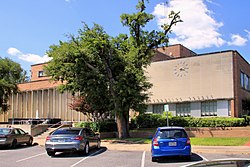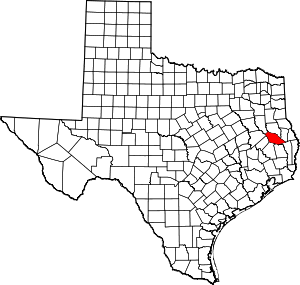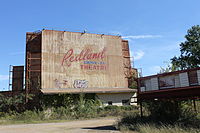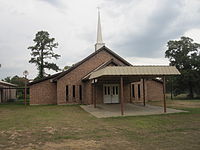Angelina County, Texas
Angelina County | |
|---|---|
 The Angelina County Courthouse in Lufkin | |
 Location within the U.S. state of Texas | |
 Texas's location within the U.S. | |
| Coordinates: 31°16′N 94°37′W / 31.26°N 94.61°W | |
| Country | |
| State | |
| Founded | 1846 |
| Named for | A Hasinai woman who assisted early Spanish missionaries and was called Angelina by them |
| Seat | Lufkin |
| Largest city | Lufkin |
| Area | |
• Total | 865 sq mi (2,240 km2) |
| • Land | 798 sq mi (2,070 km2) |
| • Water | 67 sq mi (170 km2) 7.7% |
| Population (2020) | |
• Total | 86,395 |
| • Density | 100/sq mi (39/km2) |
| Time zone | UTC−6 (Central) |
| • Summer (DST) | UTC−5 (CDT) |
| Congressional district | 17th |
| Website | www |
Angelina County (/ˌændʒəˈliːnə/ AN-jə-LEE-nə) is a county located in the U.S. state of Texas. It is in East Texas and its county seat is Lufkin.[1]
As of the 2020 census, the population was 86,395.[2][3] The Lufkin, TX Micropolitan Statistical Area includes all of Angelina County.
It was formed in 1846 from Nacogdoches County. It is named for a Hasinai Native American woman who assisted early Spanish missionaries and was called Angelina by them.[4]
History
[edit]The county's first Anglo settlers were what John Nova Lomax described as "Scotch-Irish backwoods folk."[5] Cotton farmers and slaves did not come to Angelina County because it had poor soil. Lomax added that "Culturally, the county was less moonlight-and-magnolias Dixie than a little pocket of Appalachia, where pioneers, often from similarly hardscrabble areas of Georgia, Alabama and Mississippi, wanted nothing more than to carve homesteads out of the Piney Woods and river thickets, farm a little, maybe raise a scraggly herd of tough cattle to drive to market in New Orleans."[5] Lomax added that "[t]hey also wanted to brew up a little whiskey and subsist on the bass, catfish and perch they hauled from the Neches and Angelina rivers and whatever they could trap and shoot on dry land."[5]
Settlement was still thin when Texas won its independence. Angelina County was organized on April 22, 1846, when Nacogdoches County was divided. The first permanent settler after the county was formed is thought to have been George W. Collins. The population increased quickly thereafter due to the good farming land and to the rivers, which made steamboat transportation possible. The population reached 1,165, of whom 196 were slaves, in 1850. The first county seat was Marion; successively, Jonesville became county seat in 1854, Homer in 1858, and Lufkin in 1892. Lufkin was favored by the route of the Houston, East and West Texas Railway (now the Southern Pacific), which had been built in 1882 from Houston to Shreveport.
Angelina County was settled predominantly by natives of the southern United States, some of them slaveowners who established plantations in their new Texas home. Large plantations were owned by the Stearns, Oates, Kalty, Stovall, and Ewing families. However, many Angelina County farmers were relatively poor men who owned no slaves. In 1847 slaves numbered 154, out of a total population of 834. In 1859 the number of slaves had grown to 427, valued at $269,550, and the total population was 4,271. Cotton culture, however, occupied only 2,048 acres of county land in 1858, a relatively small area for East Texas. Between 1850 and 1860 improved land in the county increased from about 3,000 to about 16,000 acres.
In 1861 Angelina County was the only county in East Texas, and one of only a handful of other Texas counties, to reject secession. This election result was startling when compared with that of Angelina County's neighbor to the immediate south, Tyler County, which supported secession by a 99 percent vote. Angelina County had also given the Constitutional Union party candidate, John Bell, a strong minority vote in the 1860 election. Two companies of county men were organized to fight in the Civil War, but they saw only limited action; only nineteen Angelina County men lost their lives in the war, and no Union soldiers entered the county before 1866.[6]
Geography
[edit]According to the U.S. Census Bureau, the county has a total area of 865 square miles (2,240 km2), of which 798 square miles (2,070 km2) is land and 67 square miles (170 km2) (7.7%) is water.[7]
Adjacent counties
[edit]- Nacogdoches County (north)
- San Augustine County (northeast)
- Jasper County (southeast)
- Tyler County (south)
- Polk County (southwest)
- Trinity County (west)
- Houston County (west)
- Cherokee County (northwest)
National protected area
[edit]- Angelina National Forest (part)
Demographics
[edit]| Census | Pop. | Note | %± |
|---|---|---|---|
| 1850 | 1,165 | — | |
| 1860 | 4,271 | 266.6% | |
| 1870 | 3,985 | −6.7% | |
| 1880 | 5,239 | 31.5% | |
| 1890 | 6,306 | 20.4% | |
| 1900 | 13,481 | 113.8% | |
| 1910 | 17,705 | 31.3% | |
| 1920 | 22,287 | 25.9% | |
| 1930 | 27,803 | 24.7% | |
| 1940 | 32,201 | 15.8% | |
| 1950 | 36,032 | 11.9% | |
| 1960 | 39,814 | 10.5% | |
| 1970 | 49,349 | 23.9% | |
| 1980 | 64,172 | 30.0% | |
| 1990 | 69,884 | 8.9% | |
| 2000 | 80,130 | 14.7% | |
| 2010 | 86,771 | 8.3% | |
| 2020 | 86,395 | −0.4% | |
| U.S. decennial census[8] 1850–2010[9] 2010[10] 2020[11] | |||

| Race / Ethnicity (NH = Non-Hispanic) | Pop 2000[12] | Pop 2010[10] | Pop 2020[11] | % 2000 | % 2010 | % 2020 |
|---|---|---|---|---|---|---|
| White alone (NH) | 55,165 | 54,889 | 49,970 | 69.41% | 63.26% | 57.84% |
| Black or African American alone (NH) | 11,656 | 12,840 | 12,872 | 14.55% | 14.80% | 14.90% |
| Native American or Alaska Native alone (NH) | 173 | 255 | 200 | 0.22% | 0.29% | 0.23% |
| Asian alone (NH) | 524 | 744 | 891 | 0.65% | 0.86% | 1.03% |
| Pacific Islander alone (NH) | 15 | 9 | 30 | 0.02% | 0.01% | 0.03% |
| Other race alone (NH) | 20 | 94 | 196 | 0.02% | 0.11% | 0.23% |
| Mixed race or Multiracial (NH) | 631 | 795 | 2,504 | 0.79% | 0.92% | 2.90% |
| Hispanic or Latino (any race) | 11,496 | 17,145 | 19,732 | 14.35% | 19.76% | 22.84% |
| Total | 80,130 | 86,771 | 86,395 | 100.00% | 100.00% | 100.00% |
As of the census[13] of 2000, there were 80,130 people, 28,685 households, and 21,255 families residing in the county. The population density was 100 people per square mile (39 people/km2). There were 32,435 housing units at an average density of 40 units per square mile (15/km2). The racial makeup of the county was 75.10% White, 14.72% Black or African American, 0.30% Native American, 0.67% Asian, 0.02% Pacific Islander, 7.77% from other races, and 1.42% from two or more races. 14.35% of the population were Hispanic or Latino of any race.
There were 28,685 households, out of which 36.10% had children under the age of 18 living with them, 57.80% were married couples living together, 12.30% had a female householder with no husband present, and 25.90% were non-families. 22.80% of all households were made up of individuals, and 9.80% had someone living alone who was 65 years of age or older. The average household size was 2.70 and the average family size was 3.18.
In the county, the population was spread out, with 27.70% under the age of 18, 9.70% from 18 to 24, 28.60% from 25 to 44, 21.50% from 45 to 64, and 12.60% who were 65 years of age or older. The median age was 34 years. For every 100 females there were 96.40 males. For every 100 females age 18 and over, there were 93.70 males.
The median income for a household in the county was $33,806, and the median income for a family was $39,505. Males had a median income of $30,373 versus $20,221 for females. The per capita income for the county was $15,876. About 12.40% of families and 15.80% of the population were below the poverty line, including 21.90% of those under age 18 and 12.30% of those age 65 or over.
Government and infrastructure
[edit]The Angelina County Sheriff's Office is the county law enforcement agency. The Sheriff is Tom Selman.[14]
Angelina County is governed by its Commissioners Court of which Keith Wright presides over as County Judge [15]
It is a "partly-wet" county, with beer and wine generally authorized for off-premises consumption.[16] However, the small community of Burke voted to restrict alcohol sales only to restaurants holding permits.
County government
[edit]| Position | Name | Party | |
|---|---|---|---|
| County Judge | Keith Wright | Republican | |
| Commissioner, Precinct 1 | Kent Walker | Republican | |
| Commissioner, Precinct 2 | Kermit Kennedy | Democratic | |
| Commissioner, Precinct 3 | Terry Pitts | Republican | |
| Commissioner, Precinct 4 | Kenneth Jeffrey | Republican | |
Politics
[edit]| Year | Republican | Democratic | Third party(ies) | |||
|---|---|---|---|---|---|---|
| No. | % | No. | % | No. | % | |
| 2024 | 26,049 | 75.68% | 8,146 | 23.67% | 227 | 0.66% |
| 2020 | 25,076 | 72.40% | 9,143 | 26.40% | 416 | 1.20% |
| 2016 | 21,668 | 72.44% | 7,538 | 25.20% | 705 | 2.36% |
| 2012 | 20,303 | 71.47% | 7,834 | 27.58% | 269 | 0.95% |
| 2008 | 19,569 | 67.13% | 9,379 | 32.17% | 205 | 0.70% |
| 2004 | 18,932 | 66.75% | 9,302 | 32.80% | 130 | 0.46% |
| 2000 | 16,648 | 61.72% | 9,957 | 36.91% | 369 | 1.37% |
| 1996 | 11,789 | 46.38% | 11,346 | 44.63% | 2,286 | 8.99% |
| 1992 | 9,722 | 36.99% | 10,318 | 39.26% | 6,241 | 23.75% |
| 1988 | 12,738 | 53.40% | 10,849 | 45.48% | 265 | 1.11% |
| 1984 | 14,685 | 61.62% | 9,054 | 37.99% | 92 | 0.39% |
| 1980 | 9,900 | 48.54% | 10,140 | 49.72% | 354 | 1.74% |
| 1976 | 7,223 | 42.21% | 9,750 | 56.98% | 139 | 0.81% |
| 1972 | 11,453 | 69.04% | 4,970 | 29.96% | 166 | 1.00% |
| 1968 | 4,645 | 29.16% | 5,174 | 32.48% | 6,111 | 38.36% |
| 1964 | 5,262 | 39.02% | 8,194 | 60.77% | 28 | 0.21% |
| 1960 | 5,169 | 41.32% | 7,046 | 56.32% | 295 | 2.36% |
| 1956 | 5,274 | 52.24% | 4,781 | 47.36% | 41 | 0.41% |
| 1952 | 4,705 | 43.00% | 6,224 | 56.88% | 13 | 0.12% |
| 1948 | 1,000 | 15.78% | 4,377 | 69.05% | 962 | 15.18% |
| 1944 | 1,001 | 16.97% | 4,387 | 74.38% | 510 | 8.65% |
| 1940 | 572 | 8.70% | 5,993 | 91.19% | 7 | 0.11% |
| 1936 | 342 | 7.97% | 3,943 | 91.91% | 5 | 0.12% |
| 1932 | 287 | 5.46% | 4,962 | 94.46% | 4 | 0.08% |
| 1928 | 1,209 | 34.41% | 2,305 | 65.59% | 0 | 0.00% |
| 1924 | 333 | 7.54% | 3,914 | 88.57% | 172 | 3.89% |
| 1920 | 205 | 7.67% | 1,661 | 62.16% | 806 | 30.16% |
| 1916 | 75 | 4.27% | 1,344 | 76.54% | 337 | 19.19% |
| 1912 | 45 | 3.94% | 1,068 | 93.60% | 28 | 2.45% |
John Nova Lomax of the Houston Press said that the residents of Angelina County "were, and are, a self-sufficient breed, good with their hands, bluntly honest and leery of all central authority."[5] (In 1861, Angelina County voted against seceding from the United States, the only East Texas county to do so.) He also said "[t]heir electoral peculiarity continued through the 20th Century."[5] Angelina County was the seat of power of Charlie Wilson, a politician labeled the "Liberal from Lufkin".[5]
The current state representative from Angelina County is Republican Trent Ashby, first elected in 2012.
Crime
[edit]In earlier days, criminals established moonshine stands. During the 1970s, some criminals established marijuana farms. As of 2011[update], the main drug dealing activity was the methamphetamine trade. Allen Hill, formerly of the Angelina County Narcotics Squad, said that the local meth trade is doing more damage to the county than drug couriers passing through the county, crack cocaine, and heroin. According to Hill, many Hispanic drug dealers increasingly sold imported "ice"-style meth made by drug cartels instead of crack cocaine or powdered cocaine, because they make more money than they did selling crack. Hill said that many of the drug dealers claim to be affiliated with Mexican drug cartels or gangs like MS-13.[18]
Education
[edit]

Primary and secondary education
[edit]The following school districts serve Angelina County (districts marked with (*) are located partly within the county and partly outside it):
- Central Independent School District
- Colmesneil Independent School District (*)
- Diboll Independent School District
- Hudson Independent School District
- Huntington Independent School District
- Lufkin Independent School District
- Wells Independent School District (*)
- Zavalla Independent School District
Colleges and universities
[edit]Angelina College, a community college, serves all of Angelina County.[19]
Stephen F. Austin State University is located in Nacogdoches, which is located in neighboring Nacogdoches County.
Transportation
[edit]Major highways
[edit] U.S. Highway 59
U.S. Highway 59
 Interstate 69 is currently under construction and will follow the current route of U.S. 59 in most places.
Interstate 69 is currently under construction and will follow the current route of U.S. 59 in most places.
 U.S. Highway 69
U.S. Highway 69 State Highway 7
State Highway 7 State Highway 63
State Highway 63 State Highway 94
State Highway 94 State Highway 103
State Highway 103 State Highway 147
State Highway 147 Farm to Market Road 1818
Farm to Market Road 1818
Bus
[edit]Greyhound Lines operates the Lufkin Station at the Kerrville Bus Company station in Lufkin.[20]
Airport
[edit]Angelina County Airport is located seven miles southwest of Lufkin.
Communities
[edit]Cities
[edit]Census-designated place
[edit]Unincorporated communities
[edit]Ghost towns
[edit]Gallery
[edit]-
Soldiers Monument at Angelina County Courthouse
-
Angelina County Peace Officers Memorial at the courthouse
-
Fountain at Angelina County Courthouse
See also
[edit]- National Register of Historic Places listings in Angelina County, Texas
- Recorded Texas Historic Landmarks in Angelina County
- List of counties in Texas
References
[edit]- ^ "Find a County". National Association of Counties. Archived from the original on May 31, 2011. Retrieved June 7, 2011.
- ^ "U.S. Census Bureau QuickFacts: Angelina County, Texas". United States Census Bureau. Retrieved January 31, 2022.
- ^ "Angelina County, Texas". United States Census Bureau. Retrieved February 23, 2021.
- ^ "About". Angelina County website. Archived from the original on February 2, 2015. Retrieved January 8, 2015.
- ^ a b c d e f Lomax, John Nova. "Texas Tweakers." Houston Press. Wednesday November 16, 2011. 3 Archived November 29, 2011, at the Wayback Machine. Retrieved on November 19, 2011.
- ^ Texas State Handbook Online
- ^ "2010 Census Gazetteer Files". United States Census Bureau. August 22, 2012. Retrieved April 18, 2015.
- ^ "Decennial Census of Population and Housing by Decades". US Census Bureau.
- ^ "Texas Almanac: Population History of Counties from 1850–2010" (PDF). Texas Almanac. Archived (PDF) from the original on October 9, 2022. Retrieved April 18, 2015.
- ^ a b "P2 Hispanic or Latino, and Not Hispanic or Latino by Race – 2010: DEC Redistricting Data (PL 94-171) – Angelina County, Texas". United States Census Bureau.
- ^ a b "P2 Hispanic or Latino, and Not Hispanic or Latino by Race – 2020: DEC Redistricting Data (PL 94-171) – Angelina County, Texas". United States Census Bureau.
- ^ "P004: Hispanic or Latino, and Not Hispanic or Latino by Race – 2000: DEC Summary File 1 – Angelina County, Texas". United States Census Bureau.
- ^ "U.S. Census website". United States Census Bureau. Retrieved May 14, 2011.
- ^ "Sheriff's Office".
- ^ "Commissioner's Court | Angelina County". Archived from the original on November 3, 2013. Retrieved November 1, 2013.
- ^ "County Wet-Dry Status". Texas Alcoholic Beverage Commission. Retrieved February 24, 2022.
- ^ Leip, David. "Dave Leip's Atlas of U.S. Presidential Elections". uselectionatlas.org. Retrieved July 19, 2018.
- ^ Lomax, John Nova. "Texas Tweakers." Houston Press. Wednesday November 16, 2011. 4. Retrieved on November 19, 2011.
- ^ Texas Education Code, Sec. 130.165. ANGELINA COUNTY JUNIOR COLLEGE DISTRICT SERVICE AREA..
- ^ ""Greyhound.com | Locations : States : Texas". Archived from the original on August 15, 2012. Retrieved July 30, 2012.." Greyhound Lines. Retrieved on July 29, 2012. NOTE: The information for Lufkin appears as a pop-up window.
External links
[edit]- Angelina County government
- Angelina County from the Handbook of Texas Online
- Angelina County from the Texas Almanac
- Angelina County from the TXGenWeb Project




